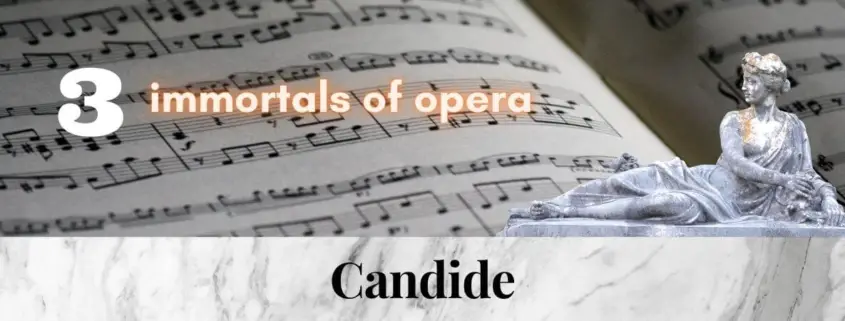3 immortal pieces from Bernstein’s opera Candide – the best interpretations in YouTube
This operetta by Leonard Bernstein is an absolute gem. Each of the pieces has stunning humor, passion and musicality. It is both comedy and social criticism. It is the overture that has made it to fame, and one almost has to go back to Rossini to find a prelude that so perfectly captures the comedy of the plot.
The Famous Overture
Bernstein’s witty and musically sparkling overture is one of the most frequently performed pieces by American classical composers. In the style of Rossini, it cites many of the operatic themes we will encounter in such pieces as “The Best of All Possible Worlds,” “Battle Music,” “Oh, Happy We,” and “Glitter and Be Gay.”
We hear it in the interpretation conducted by the composer himself.
Overture – Bernstein
Glitter and be Gay – the great aria of Cunegonde
Although the title role belongs to the male lead Candide, Cunegonde gets to sing the most famous aria. This aria became a showpiece for coloratura sopranos.
Bernstein called Candide a Valentine card for European opera. This aria of Cunegonde singing about luxury and jewelry is not accidentally set in Paris, for it is a blatant parody of Gounod’s “Jewel Aria” from his masterpiece “Faust”.
This piece is an aria for coloratura soprano with the pretensions of an operatic aria. It presents the performer with some difficulties. On the one hand, the aria has a large range – three high Es must be sung! – and for another, some of the ornamented scales are extremely tricky. In addition, the whole thing must be sung with apparent lightness and wit; we are, after all, in a comedy.
Barbara Cook was the first cunegonde. The casting team then had great difficulty in finding a suitable singer who could manage the high notes. Bernstein personally selected Barbara Cook and coached her for this difficult role. Cook later compared singing this piece to an athletic Grosseffort. On the recording, one no longer feels the drudgery; the joy of singing in this piece is infectious.
Glitter and be gay – Cook
The Rousing Flamenco of the Old Lady
This other stunning piece is about a flamenco. The old lady speaks of her origin from Rovno Gobernia. This is not from a place specification of Voltaire, but an incursion of Bernstein. Namely, Rovno Gobernia was the birthplace of his father who emigrated from Russia. The text of this piece was written by Bernstein himself. An anecdote says that while writing the lyrics to Rovno Gobernia he could not find a rhyme and complained to his (Spanish speaking) wife Felicia. Since the old lady sings Spanish in flamenco, Felicia spontaneously came up with the hilarious verse “me muero me sale una hernia” (“I am dying, I think I am growing a hernia”).
We hear this piece in a wonderful interpretation by Christa Ludwig.
I was not born in sunny hispania … I am so easily assimilated – Christa Ludwig.







Leave a Reply
Want to join the discussion?Feel free to contribute!